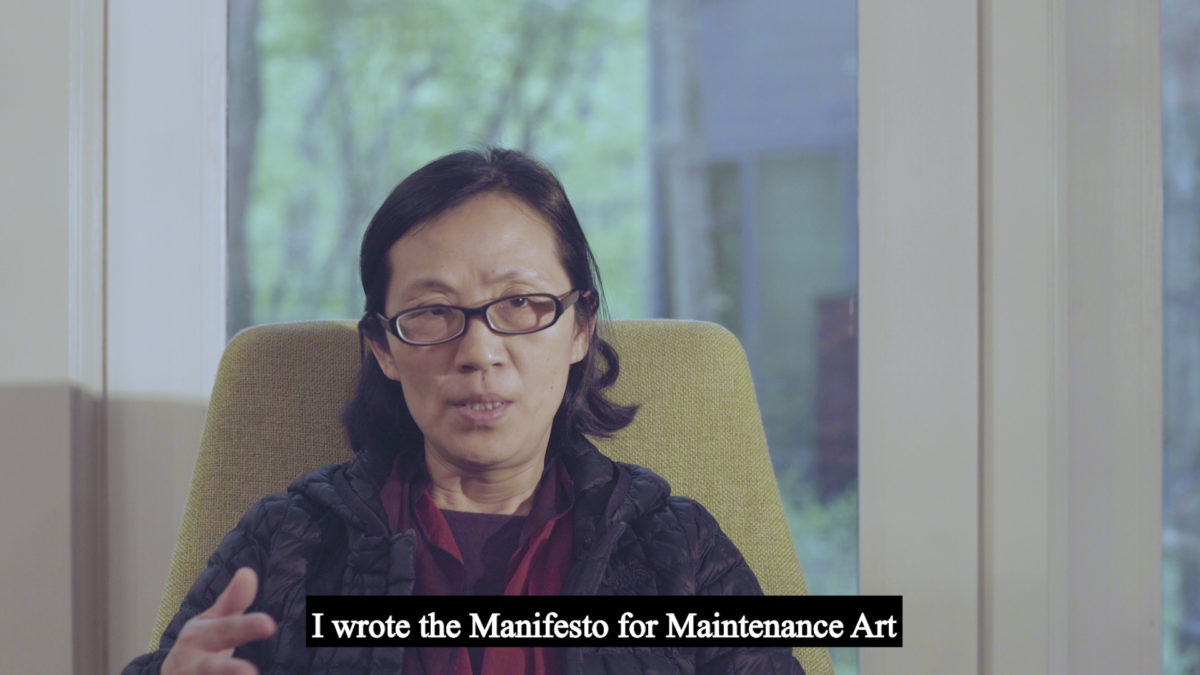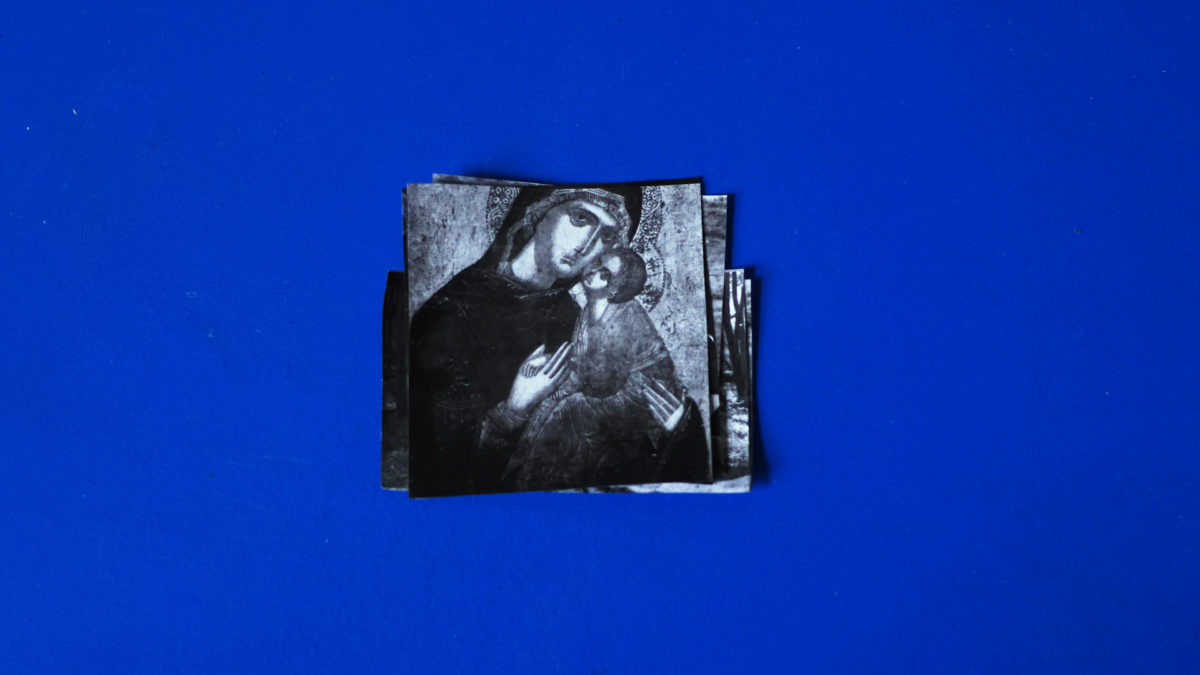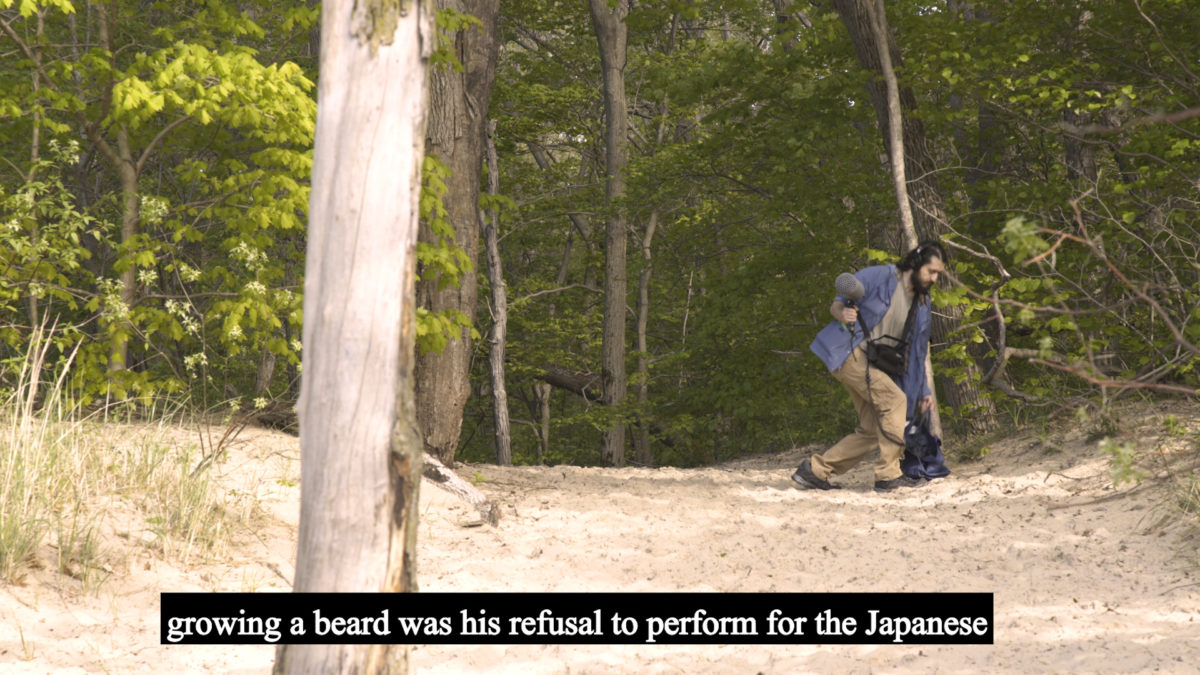“I became an artist to be free,” says Cherrie Yu’s mom, who has never made a work of art. She asks her daughter if her tone is correct. “Right? This feels like I’m just talking to you.” “One more time,” says Yu. She begins “Parent Film” by retrofitting the words of artist Mierle Laderman Ukeles inside her mother’s mouth, staging a hypothetical scenario in which Mrs. Yu sacrificed her own art career so Cherrie could have one. Yu’s dad, an engineer, and mom, a homemaker and manager of their family finances, have always supported Yu, and traveled from China for their daughter’s graduation from the School of the Arts Institute of Chicago, sitting in the audience while Ukeles delivered the commencement address.
“Maintenance is a drag; it takes all the fucking time,” writes Ukeles in Manifesto for Maintenance Art 1969!. “Clean your desk, wash the dishes, clean the floor…mend the fence…throw out the stinking garbage.” She argues that maintenance is art, splitting art into two camps: Development Art (“pure individual creation; the new; change; progress”) and Maintenance Art (“keep the dust off the pure individual creation; preserve the new; sustain the change; protect progress”). In the commencement address, Ukeles skewers the solo male geniuses who inspired her (“Uncle Pollock” “Uncle Duchamp” “Uncle Rothko”), who each had time to make art because someone, often female, wiped up the mess. Yu morphs the manifesto to consider her complicated relationship to herself as beneficiary of the sacrifices the nuclear family often makes for children. By Ukeles’s definition, Yu’s parents’ care always was, and continues to be, art.

“Parent Film” arranges seemingly disparate anecdotes (personal, mythological, art historical) around footage taken during a Midwestern family road trip post-graduation. In one scene, Yu’s father reminisces about his own father teaching him how to cook “pig trotters” while we see the back of his daughter’s head watching Chantel Akerman’s Jeanne Dielman, 23 quai du Commerce, 1080 Bruxelles, a film famous for depicting, among other gendered forms of labor, the acts of housework and meal preparation in real time. That Yu chooses to juxtapose this scene with voiceover of her father’s cross-generational recipe creates a space to meditate on how much labor it takes to earn the label of “good” father or “good” mother. While “good” artists are measured by the originality of their products, assessing whether or not a parent is “good” depends solely on how much they’re willing to give up.

“Parent Film”’s pacing takes cues from Akerman’s long takes and the repetition of Yvonne Rainer’s minimalist dance. Shots of a maintenance worker squeegeeing a glass door, or Yu and two dancers rolling their wrists in unison, mimic monotonous domestic chores. Around the halfway point, Yu’s mother nods off in front of the camera. Caring for other people is exhausting.
Yu bookends the film with two tigers. Early on, her father narrates a scene from Wide Margin, a 14th century novel by Shi Nai’an, in which a man gets wasted at a tavern and then, refusing to heed the waitstaff’s warnings about a local tiger, stumbles upon the majestic animal alone on a mountain path, somehow killing it with a combination of brute strength and luck. In a recent conversation, Yu noted that “the male hero slaying a beast” trope exists cross-culturally, with brawny Herculeses and Meleagers besting lions, boars, etc on every continent. Are they Development Artists, surviving on solipsism, even earning the coveted label “hero” for their willingness to sloppily go it alone?
If so, maybe the film’s final scene epitomizes the Maintenance Artist. The film’s most parable-like anecdote is actually an original composition by Yu. As her hands slide cut-outs creating a low-fi animated storybook, her voiceover tells the tale of a tiger who steals a woman’s baby. When she confronts the tiger, it says she can only get her child back if she completes a series of tasks. After she risks her life to complete them, the tiger says “I cannot give you your child back. What’s done cannot be undone.” Although the Maintenance Artist, the parent, has given up everything, a different form of strength and self-knowledge crystallizes, one Hercules will never know.





